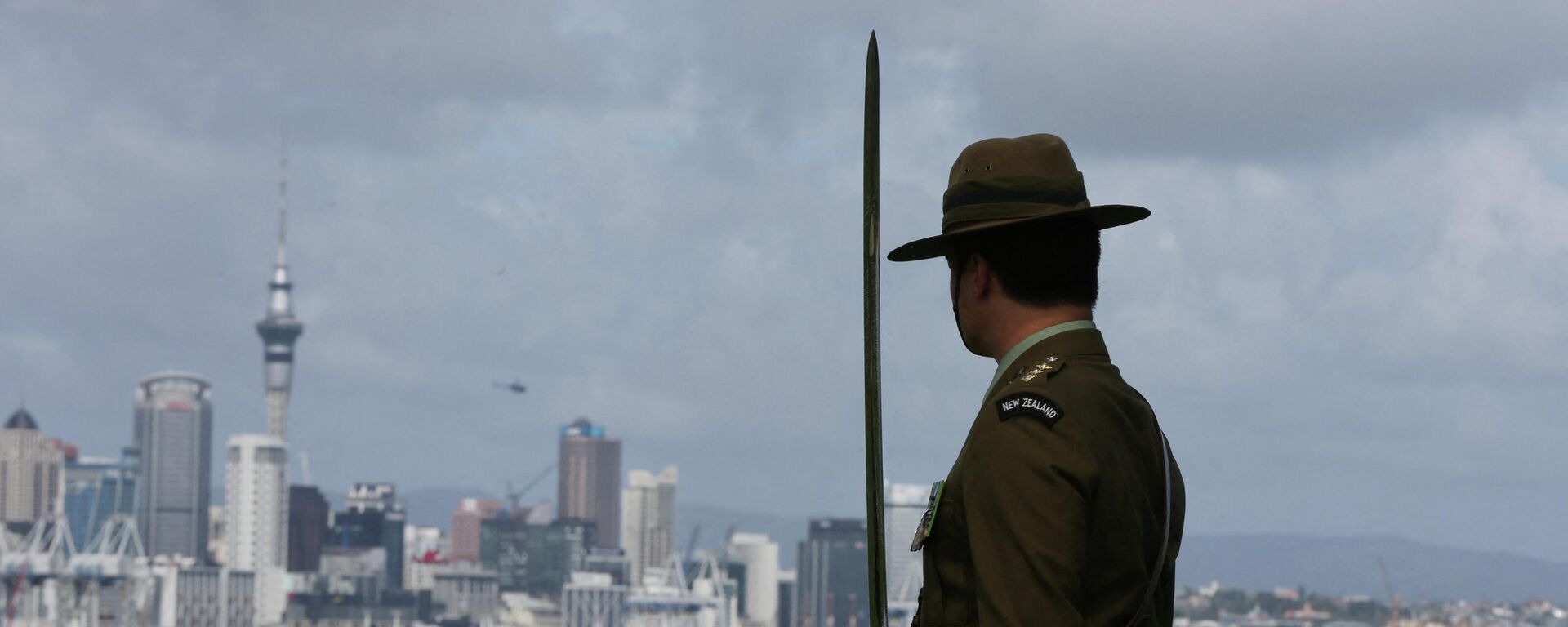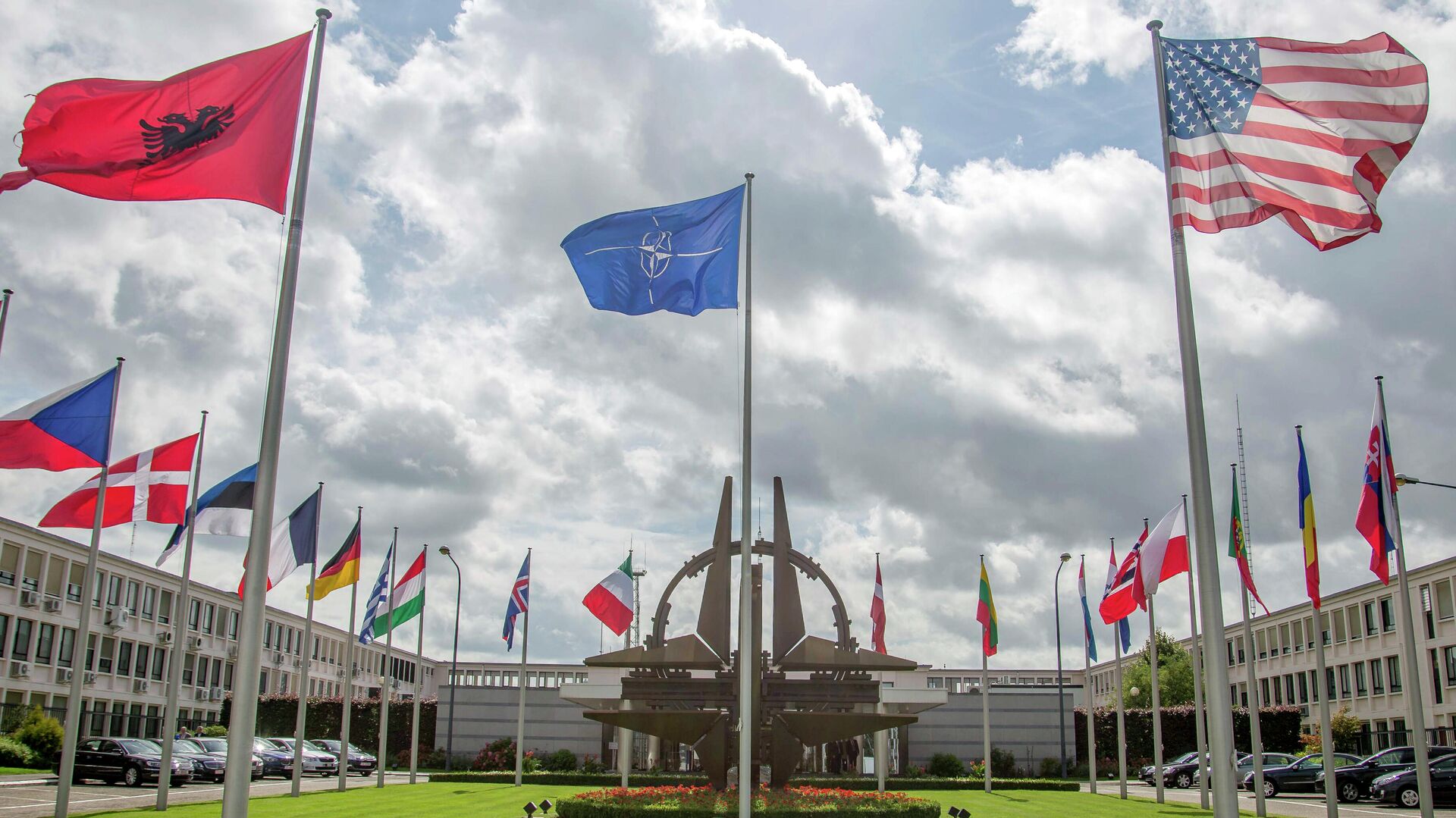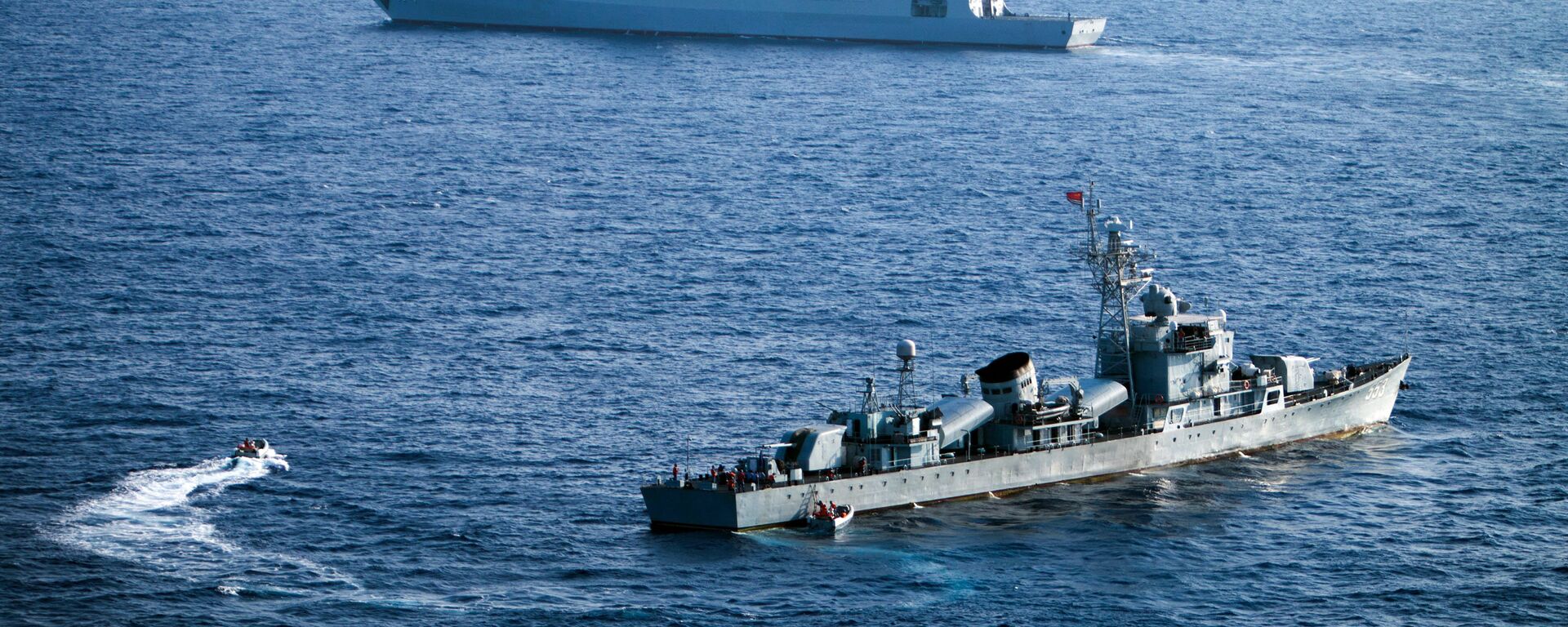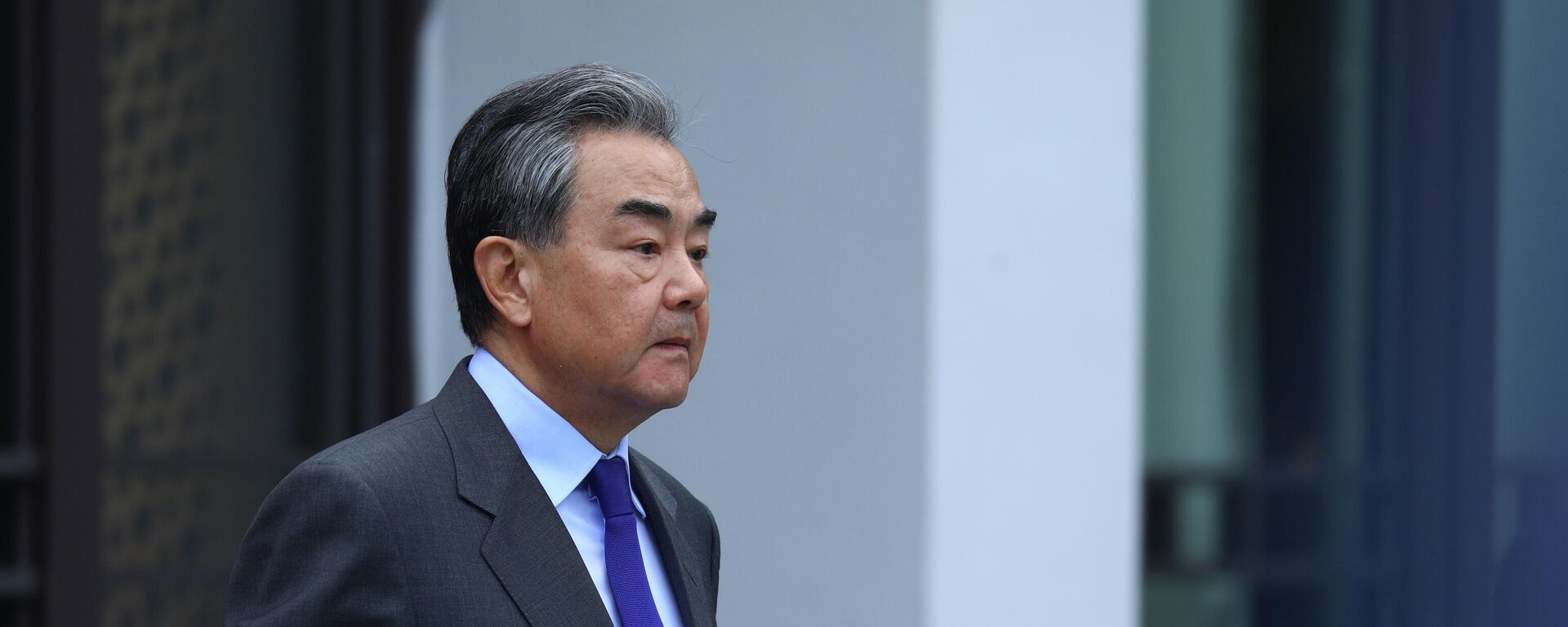https://sputnikglobe.com/20220928/china-in-the-crosshairs-why-natos-next-line-of-defense-will-be-south-china-sea-1101312790.html
China in the Crosshairs: Why NATO's Next 'Line of Defense' Will be South China Sea
China in the Crosshairs: Why NATO's Next 'Line of Defense' Will be South China Sea
Sputnik International
NATO will soon draw a new "defense line" across the South China Sea, warned Russian Foreign Minister Sergei Lavrov at the 77th UN General Assembly. Chinese and... 28.09.2022, Sputnik International
2022-09-28T13:25+0000
2022-09-28T13:25+0000
2023-06-19T12:45+0000
analysis
us
nato
china
asia
xi jinping
south china sea
taiwan strait
taiwan
https://cdn1.img.sputnikglobe.com/img/07e6/01/0c/1092193700_66:0:3707:2048_1920x0_80_0_0_bff7716b0c9ccaa2e046bb2f54e2a3b8.jpg
"NATO is still dominated by the United States, and its center of gravity shifts in accordance with the US major strategic course," explained Chen Xiangmiao, expert of the China Institute of the South China Sea. "The US and the West are turning their strategic focus to the regions close to China with the aim to contain Beijing, because they are worrying about China's growing influence."Signs of NATO shifting into the Asia-Pacific region have been emerging since 2018 when the UK, Germany and France started to expand their influence there, including in the South China Sea, according to Chen.The recent tensions over the Taiwan Strait indicated that NATO members are also gradually shifting their focus and are increasingly expressing their own position on this issue, he noted.In early August, US House Speaker Nancy Pelosi visited the island of Taiwan – which is considered an inalienable part of the People's Republic of China by Beijing – despite vocal opposition by the Chinese leadership. Following Pelosi's controversial trip, China's People's Liberation Army (PLA) kicked off unprecedented military drills around the island.On September 7, a group of French lawmakers landed in Taipei - becoming the first high-level western delegation since the US House speaker's visit. According to island authorities, it was the fourth visit by French politicians over the past 12 months. Earlier, the UK House of Commons’ Foreign Affairs Committee signaled willingness to visit Taiwan in November or early December, according to the Taipei Times.Likewise, Taiwan’s de facto ambassador to Berlin, Shieh Jhu-Wey, praised what he called "the start of a shift by Germany towards a more assertive stance on China," as quoted by Reuters. Shieh also made a vague hint about improvements in Berlin's attitude to the island of Taiwan.The Chinese scholar likewise drew attention to the UK, French and German efforts to expand their military presence in the Asia-Pacific region: "We can see the British aircraft carrier HMS Queen Elizabeth, and the German destroyer Bayern and the French aircraft carrier Charles de Gaulle deployed in the Asia-Pacific region," he highlighted."What's more, Britain and Germany actually want to turn their military activities in the Indo-Pacific region into a new 'normal'," Chen emphasized. "The United Kingdom sends its destroyers there. Germany has also expressed a desire to have a military presence in the Indo-Pacific region. And while their military forces are not based in the countries surrounding the South China Sea, we understand that they are targeting the tense areas in the South China Sea and the Taiwan Strait."In addition, three Anglophone countries have formed the AUKUS, a trilateral security pact between Australia, the UK and the US for the Asia-Pacific region, the Chinese expert said, adding that Britain and other western states are simultaneously building bilateral mechanisms for cooperation in the field of military security with regional players.NATO Security Doctrine Sees China as Longtime 'Systemic Challenge'Meanwhile, NATO's security doctrine has been undergoing change in recent years employing a tougher tone towards China.From its inception in 1949, NATO's main adversary was the Soviet Union, and then Russia. However, China's rapid rise prompted Washington to announce the "Pivot to Asia" under President Barack Obama and further shift its focus to the Asia-Pacific region under successive administrations.In 2021, NATO unveiled its 2030 security doctrine openly calling Russia and China its two looming threats. During the June 2021 Summit in Brussels, NATO leaders "agreed on the need to address the challenges posed by China’s growing influence and international policies, and to engage with China to defend NATO’s security interests," according to the alliance's official website.During the June 2022 Madrid Summit, NATO put forward a new blueprint for the future, singling out the People's Republic of China as a longstanding "systemic challenge" for the Euro-Atlantic security through purported "malicious hybrid and cyber operations," and "[attempts] to control key technological and industrial sectors, critical infrastructure, and strategic materials and supply chains."While Russia was labeled as "the most significant and direct threat to Allies’ security and to peace and stability in the Euro-Atlantic area," the alliance emphasized that Beijing's "ambitions and coercive policies challenge [the alliance's] interests, security and values. (…) The deepening strategic partnership between the People’s Republic of China and the Russian Federation and their mutually reinforcing attempts to undercut the rules-based international order run counter to our values and interests," the NATO 2022 strategic concept claimed.US-China Relations: Washington is Raising Stakes"Sooner or later, there will be a confrontation between the United States and China, the question is when and how. I think that the South China Sea will become the next line of defense for NATO no sooner than in 5-10 years," suggested the former director of the Institute for Strategic Studies of the Ministry of Public Security of Vietnam, Major General Le Van Cuong.The major general believes that over the next ten years, China will try to avoid a direct confrontation with the US, since the war could become "very disadvantageous" for Beijing in both political and economic terms. For its part, the US is not capable of thwarting a rapidly growing China.However, there is no doubt that the US is determined to step up pressure on Beijing in the near term, according to Le Van Cuong. For that reason, the US Seventh Fleet continues to hold the so-called freedom of navigation operations (FONOP) in the South China Sea while Washington interferes with China's attempts to settle the ongoing maritime dispute with other regional claimants Brunei, Indonesia, Malaysia, the Philippines, Taiwan, and Vietnam. The dispute over the South China Sea involves conflicting island and maritime claims by the regional players.In order to further increase pressure on Beijing, the US formed the Quadrilateral Security Dialogue (Quad) together with Japan, Australia, and India. The organization was established under the Trump administration in 2017 and is sometimes referred to as Asia-Pacific’s "NATO."In May 2022, the leaders of the United States, Japan, India and Australia met in Tokyo and unveiled an Asia-Pacific maritime surveillance initiative – the Indo-Pacific Partnership for Maritime Domain Awareness (IPMDA). The declared aim of the new endeavor is to work with regional partners to respond to humanitarian and natural disasters and combat illegal fishing.While not mentioning China by name, the Quad's statement read that it "strongly oppose[s] any coercive, provocative or unilateral actions that seek to change the status quo" in the Asia Pacific, accusations routinely leveled by western politicians and mainstream press against China.However, contrary to the efforts and tough statements issued by Washington, the other members of the Quad are rather cautious about the idea of an "Asian NATO," according to the major general. India is a leading country in the non-aligned movement and is interested in issues related to common interests such as maritime security, cooperation against terrorism, etc. On the other hand, heavy dependence on the Chinese market causes Australia to drag its feet about joining a formal military alliance against China.Nonetheless, China is monitoring the maneuvers of the US, NATO and their Asia-Pacific allies closely. Last week Chinese President Xi Jinping emphasized the necessity for further reforming the country’s armed forces while directing the military to focus on combat readiness. Xi said that over the past decade, China was able to "solve long-standing systemic obstructions, structural incongruities, and policy issues in the development of national defense and the armed forces," as quoted by the Chinese Defense Ministry.
https://sputnikglobe.com/20220920/chinese-foreign-minister-nancy-pelosis-sneaky-taiwan-visit-undermined-sino-us-relations-1101017088.html
https://sputnikglobe.com/20220810/new-zealand-could-eventually-join-aukus-us-deputy-secretary-of-state-wendy-sherman-1099438820.html
https://sputnikglobe.com/20220522/chinas-pacific-security-pacts-a-response-to-the-quad-threat-us-taiwan-rapprochement-1095702948.html
https://sputnikglobe.com/20220725/south-china-sea-not-a-safari-park-for-countries-outside-the-region-chinese-foreign-minister-says-1097773901.html
china
south china sea
taiwan
Sputnik International
feedback@sputniknews.com
+74956456601
MIA „Rossiya Segodnya“
2022
News
en_EN
Sputnik International
feedback@sputniknews.com
+74956456601
MIA „Rossiya Segodnya“
Sputnik International
feedback@sputniknews.com
+74956456601
MIA „Rossiya Segodnya“
us, nato, china, xi jinping, south china sea, taiwan strait, taiwan
us, nato, china, xi jinping, south china sea, taiwan strait, taiwan
China in the Crosshairs: Why NATO's Next 'Line of Defense' Will be South China Sea
13:25 GMT 28.09.2022 (Updated: 12:45 GMT 19.06.2023) NATO will soon draw a new "defense line" across the South China Sea, warned Russian Foreign Minister Sergei Lavrov at the 77th UN General Assembly. Chinese and Vietnamese experts shed light on the reasons behind Lavrov's warning in an interview with Sputnik.
"NATO is still dominated by the United States, and its center of gravity shifts in accordance with the US major strategic course," explained Chen Xiangmiao, expert of the China Institute of the South China Sea. "The US and the West are turning their strategic focus to the regions close to China with the aim to contain Beijing, because they are worrying about China's growing influence."
Signs of NATO shifting into the Asia-Pacific region have been emerging since 2018 when the UK, Germany and France started to expand their influence there, including in the South China Sea, according to Chen.
The
recent tensions over the Taiwan Strait indicated that NATO members are also gradually shifting their focus and are increasingly expressing their own position on this issue, he noted.
In early August, US House Speaker Nancy Pelosi visited the island of Taiwan – which is considered an inalienable part of the People's Republic of China by Beijing – despite vocal opposition by the Chinese leadership. Following Pelosi's controversial trip, China's People's Liberation Army (PLA) kicked off unprecedented military drills around the island.

20 September 2022, 15:14 GMT
On September 7, a group of French lawmakers landed in Taipei - becoming the first high-level western delegation since the US House speaker's visit.
According to island authorities, it was the fourth visit by French politicians over the past 12 months. Earlier, the UK House of Commons’ Foreign Affairs Committee signaled willingness to visit Taiwan in November or early December, according to the Taipei Times.
Likewise, Taiwan’s de facto ambassador to Berlin, Shieh Jhu-Wey, praised what he called "the start of a shift by Germany towards a more assertive stance on China," as
quoted by Reuters. Shieh also made a vague hint about improvements in Berlin's attitude to the island of Taiwan.
"It should be noted that, in fact, NATO's attitude towards the Asia-Pacific region has already been formed," argued Chen. "This is especially evident from the position of such large countries as Germany, France and Great Britain. Their behavior has changed in several aspects, one of which is foreign policy speeches. They have consistently expressed their position on South China Sea issues at G7 meetings, on behalf of the EU or in separate British diplomatic statements. This year they spoke both on the Philippines and on the Taiwan issue."
The Chinese scholar likewise drew attention to the UK, French and German efforts to expand their military presence in the Asia-Pacific region: "We can see the British aircraft carrier HMS Queen Elizabeth, and the German destroyer Bayern and the French aircraft carrier Charles de Gaulle deployed in the Asia-Pacific region," he highlighted.
"What's more, Britain and Germany actually want to turn their military activities in the Indo-Pacific region into a new 'normal'," Chen emphasized. "The United Kingdom sends its destroyers there. Germany has also expressed a desire to have a military presence in the Indo-Pacific region. And while their military forces are not based in the countries surrounding the South China Sea, we understand that they are targeting the tense areas in the South China Sea and the Taiwan Strait."
In addition, three Anglophone countries have formed the AUKUS, a trilateral security pact between Australia, the UK and the US for the Asia-Pacific region, the Chinese expert said, adding that Britain and other western states are simultaneously building bilateral mechanisms for cooperation in the field of military security with regional players.
"The use of this tool is also an important part of the NATO countries' plan to maintain their presence in the Asia-Pacific region for a long period of time," Chen noted. "For example, Germany and Japan actually agreed on military support for each other by signing an information exchange agreement."

10 August 2022, 06:14 GMT
NATO Security Doctrine Sees China as Longtime 'Systemic Challenge'
Meanwhile, NATO's security doctrine has been undergoing change in recent years employing a tougher tone towards China.
From its inception in 1949, NATO's main adversary was the Soviet Union, and then Russia. However, China's rapid rise prompted Washington to announce the "Pivot to Asia" under President Barack Obama and further shift its focus to the Asia-Pacific region under successive administrations.
In 2021, NATO unveiled its 2030 security doctrine openly calling Russia and China its two looming threats. During the June 2021 Summit in Brussels, NATO leaders "agreed on the need to address the challenges posed by China’s growing influence and international policies, and to engage with China to defend NATO’s security interests,"
according to the alliance's official website.
During the June 2022 Madrid Summit, NATO put forward a new
blueprint for the future, singling out the People's Republic of China as a longstanding "systemic challenge" for the Euro-Atlantic security through purported "malicious hybrid and cyber operations," and "[attempts] to control key technological and industrial sectors, critical infrastructure, and strategic materials and supply chains."
While Russia was labeled as "the most significant and direct threat to Allies’ security and to peace and stability in the Euro-Atlantic area," the alliance emphasized that Beijing's "ambitions and coercive policies challenge [the alliance's] interests, security and values. (…)
The deepening strategic partnership between the People’s Republic of China and the Russian Federation and their mutually reinforcing attempts to undercut the rules-based international order run counter to our values and interests," the NATO 2022 strategic concept claimed.US-China Relations: Washington is Raising Stakes
"Sooner or later, there will be a confrontation between the United States and China, the question is when and how. I think that the South China Sea will become the next line of defense for NATO no sooner than in 5-10 years," suggested the former director of the Institute for Strategic Studies of the Ministry of Public Security of Vietnam, Major General Le Van Cuong.
The major general believes that over the next ten years, China will try to avoid a direct confrontation with the US, since the war could become "very disadvantageous" for Beijing in both political and economic terms. For its part, the US is not capable of thwarting a rapidly growing China.
However, there is no doubt that the US is determined to step up pressure on Beijing in the near term, according to Le Van Cuong. For that reason, the US Seventh Fleet continues to hold the so-called freedom of navigation operations (FONOP) in the South China Sea while Washington interferes with China's attempts to settle the ongoing maritime dispute with other regional claimants Brunei, Indonesia, Malaysia, the Philippines, Taiwan, and Vietnam. The dispute over the South China Sea involves conflicting island and maritime claims by the regional players.
In order to further increase pressure on Beijing, the US formed the Quadrilateral Security Dialogue (Quad) together with Japan, Australia, and India. The organization was established under the Trump administration in 2017 and is sometimes referred to as Asia-Pacific’s "NATO."
In May 2022, the leaders of the United States, Japan, India and Australia met in Tokyo and unveiled an Asia-Pacific maritime surveillance initiative – the Indo-Pacific Partnership for Maritime Domain Awareness (IPMDA). The declared aim of the new endeavor is to work with regional partners to respond to humanitarian and natural disasters and combat illegal fishing.
While not mentioning China by name, the Quad's statement read that it "strongly oppose[s] any coercive, provocative or unilateral actions that seek to change the status quo" in the Asia Pacific, accusations routinely leveled by western politicians and mainstream press against China.
"The ultimate goal of the Quad is to resist China," explained Le Van Cuong.
However, contrary to the efforts and tough statements issued by Washington, the other members of the Quad are rather cautious about the idea of an "Asian NATO," according to the major general. India is a leading country in the non-aligned movement and is interested in issues related to common interests such as maritime security, cooperation against terrorism, etc. On the other hand, heavy dependence on the Chinese market causes Australia to drag its feet about joining a formal military alliance against China.
"I think that for another 5-7 years the Quad will be a wavering, loose structure, unable to become an 'Asian NATO'," Major General Le Van Cuong argued.
Nonetheless, China is monitoring the maneuvers of the US, NATO and their Asia-Pacific allies closely. Last week Chinese President Xi Jinping emphasized the necessity for further reforming the country’s armed forces while directing the military to focus on combat readiness. Xi said that over the past decade, China was able to "solve long-standing systemic obstructions, structural incongruities, and policy issues in the development of national defense and the armed forces," as quoted by the Chinese Defense Ministry.






